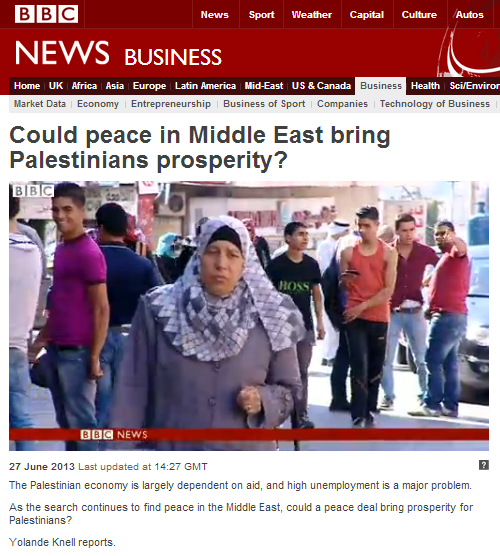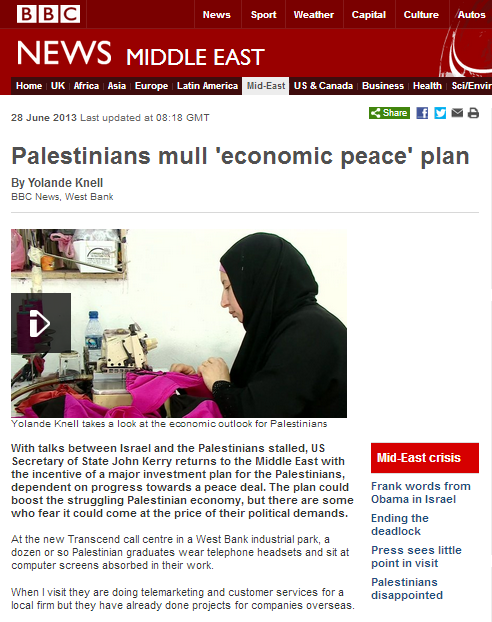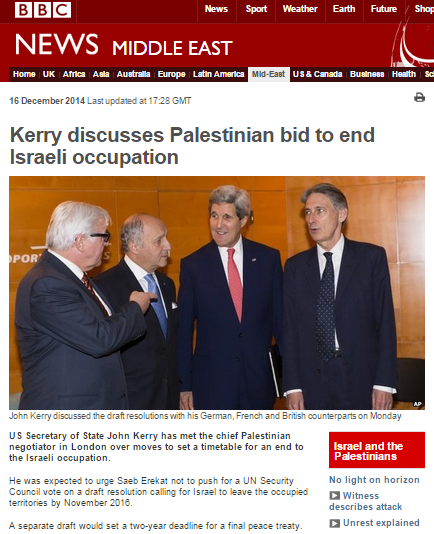June 27th 2013 saw the appearance on the BBC News website’s Middle East page of a filmed report by Yolande Knell on the subject of the economy in PA controlled areas, which was also shown on BBC television news.
The next day, a written report by Knell on the same subject appeared in the ‘Features & Analysis’ section of the Middle East page of the BBC News website.
Knell’s overall implied message to her audiences in both pieces is that it is Israel’s fault that the Palestinian economy is in the doldrums. That message is promoted by completely ignoring certain factors whilst distorting others.
In her written article Knell informs readers that:
“Across the Palestinian territories, nearly a quarter of the workforce is unemployed. Overall the economy relies on foreign donors’ aid and is stagnating.”
According to the Palestinian Central Bureau of Statistics, figures for the first quarter of 2013 show that unemployment in the PA-controlled areas stood at 20.3% and in the Hamas-controlled area at 31.0%, with an overall average of 23.9%.
For comparison’s sake, unemployment in Spain stood at 26.9% in May 2013 and in Greece at 26.8% in March of the same year.
Between 1995 and 2013 the average level of unemployment in the areas controlled by the PA and/or Hamas was 22.44%. The lowest rate of unemployment in those years was 8.80% in June 2000. The highest rate was 35.60% in September 2002.
Of course one of the major contributing causes to that fluctuation was the decision made by the Palestinian Authority to start the second Intifada in September 2000. Knell however neglects to mention that important event at all, let alone inform her audiences of the effects of that decision on the Palestinian economy in general and on the issue of movement. Instead she makes the vague, context-free statement:
“The difficult economic situation is caught up with the politics; the Palestinians’ long-running conflict with Israel has led to restrictions on the movements of people and goods.”
Later on she emphasizes her point by quoting one of her interviewees:
” “Israel controls the borders – and that means the importing, exporting, the checkpoints, the regulations. Our government – the Palestinian Authority – doesn’t have much control and it leaves us helpless,” Ms Arja adds.”
Knell fails to make clear the fact that checkpoints and security regulations are a direct product of the decision by Arafat to launch a terror war on Israel and the PA’s failure to tackle the subject of terrorism effectively. Presumably in a nod to token impartiality, she adds:
“Israel says its checks on Palestinian goods are necessary for security.” [emphasis added]
Using same interviewee as a ‘case study’ to promote her points, Knell makes some bizarre insinuations.
“For now many Palestinian businesses are struggling.
The Arja Textiles Company in Beit Jala employs more than 70 local workers but recently it has had to cut jobs.
Most of its dyeing machines sit idle because of high electricity costs and water shortages.
“As you can imagine water is essential for this process and water is very short here so we might work here just twice a week and in July we have to shut the operation down because the electricity price will be higher,” says Tamara Arja.
Immediately following those words come the following statements – which will be interpreted by most readers as meaning that Israel is responsible for the issues outlined in the previous four sentences.
Palestinian allocation of water is laid out in the 1993 Oslo Accords. In the summer, supplies to the West Bank can be restricted.
All electricity in the West Bank is currently supplied by Israel. The owners of the family firm say it also faces other impediments.”
Beit Jala is of course situated in Area A and has been under Palestinian Authority control since 1993 – i.e. for two decades – with its power and water supplies therefore under Palestinian control. According to the UN: 
“Beit Jala is connected to a public electricity network; served by Jerusalem Electricity Company, which is the main source of electricity in the city.”
“Beit Jala is provided with water by the Palestinian Water Authority (PWA), through the public water network.”
The Jerusalem District Electricity Company (JDECO) indeed purchases electricity from the Israel Electric Corporation rather than producing its own power – with the problem of its significant debt to the latter being an ongoing issue.
“For his company’s enormous debt, Omari [JDECO CEO] largely blames both refugee camp residents who refuse to pay their electricity bills and government bodies that have likewise faltered on payments.
Within JDECO’s jurisdiction, there are about 12 refugee camps. Only about 5% of the residents of these camps actually pay their electricity bills, however, and “there is a big amount of electricity theft there and also in the villages,” according to Omari. […]
Meanwhile, the PA itself owes JDECO NIS 120 million for electricity bills in various government buildings, schools, hospitals and water-pumping stations that it has failed to pay.”
Knell’s claim of higher electricity prices in the month of July clearly needs to be taken up with the company actually supplying the power rather than with Israel – and conveniently the Beit Jala municipality (which, together with other towns receiving electricity from JDECO, owns 25% of the company’s shares) has a representative on the company’s Board of Directors. What a pity then that Knell’s visit to Beit Jala did not include a chat with the person who could have provided background information about this obviously internal Palestinian problem.
As for Knell’s equally shoddy attempt to suggest that water supply problems in Beit Jala are caused by Israel, she not only fails to note that Israel exceeds its obligations under the terms of the Oslo Accords in that field, but also neglects to inform readers of the long-term mismanagement of that resource by the Palestinian Water Authority which actually does supply Beit Jala’s water.
“According to the [Interim] agreement (Article 40) Palestinians are entitled to 196 MCM of self-extracted water per year, plus an additional 31 MCM that Israel needs to actively supply from its own water and with its own infrastructure. Combined, the Agreement states that the Palestinians in the West Bank are entitled to an availability of 227 MCM of water.”
“In reality, West Bank Palestinians have access to over 248 MCM of fresh natural water. This is because Israel supplies an extra 21 MCM beyond its obligation (2010 figure). Adding to this, approximately 17 MCM of water is extracted through unapproved wells from the Northern and Western Basins, against the Interim Agreement and at Israel’s expense (because the water current naturally flows towards the Israeli side.)”
“The P.W.A. estimates their total water loss, or ‘unaccounted-for-water’ (UFW) at 33%.This figure includes both actual loss due to poorly maintained infrastructure, as well as unpaid-for water, used by Palestinian citizens, but for which the Palestinian Authority did not receive payment.”
“Israel recycles wastewater and uses the clean output for agriculture. The Palestinians do not recycle their wastewater.”
(Previous BBC misrepresentations on the subject of water have been addressed here and here.)
One notable factor about the PA economy ignored by Knell is the fact that an estimated 60,000 of the 150,000 employees on the Palestinian Authority payroll are located in the Gaza Strip – where the PA has not functioned for the past six years. Another very important aspect – which Knell also avoids mentioning altogether – is the fact that 6% of the PA’s annual budget ($ 4.5 million per month) is allocated to paying salaries to convicted terrorists and the families of suicide bombers.
Had that money (along with some of the $ 900 million diverted by Arafat to non-PA bank accounts between the years 1995 – 2000) been invested in creating a production-orientated economic infrastructure designed to alleviate the current situation in which 55% of the workforce is employed in services and only 28.4% in industry and 16.1% in agriculture, the PA economy might well be in much better health than it is today.
But Knell has no interest in informing the taxpayers in donor countries to the Palestinian Authority why two decades of their generous contributions have failed to produce a viable Palestinian economy. Instead she produces a trite cartoon version of the story which depicts poor, agency-free Palestinians struggling under the yoke of Israeli ‘occupation’ and is perfectly in keeping with the BBC’s habitual politically motivated narrative.
Accurate, impartial and informative reporting this is not.






